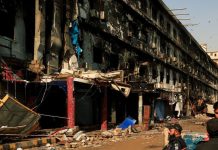LAHORE: Students, professionals and families from Baltistan, a mountainous region in the region of Gilgit-Baltistan, celebrated the Persian New Year Nowruz in Lahore.
Nowruz is a spring festival and new year celebration named for the Persian word meaning “new day.” It is celebrated all over Asia with a variety of local traditions. In Iran, it lasts at least 13 days, and is celebrated in Gilgit-Baltistan for two to three days.
“Some people call it a Kurdish celebration and some call it a Persian celebration, but most of the people follow the Persian calendar for the celebration of Nowruz, which is widely known in our local community as the arrival of spring and festival of colours,” Tadheer Kazmi, the chief organiser from the Balti community, told.
In the Balti tradition, locals paint boiled eggs and then participate in an egg fight. Each participant tries to break the egg of the other, and whoever wins will have good luck next year.
“The person who wins can take both eggs with him. We boil the eggs and then paint them in different colours of spring,” said Kazmi.
The famous Balti singer Sarwar Baltistani also performed at the event, and all the participants enjoyed their traditional Balti dance.
Earlier, the Consul General of Iran in Lahore also hosted a big gathering for their families and invited many local dignitaries from the provincial capital to be part of their festival of welcoming the new year.
Consul General Mohammad Reza Nazeri, while speaking at the event, said: “It gives us immense pleasure to share this happiness with our brothers and sisters here in Lahore. You all are like our families, and we extend our warm welcome on behalf of our country.”
While explaining the typical Iranian traditions, Cultural Attaché Jafar Ronas said: “We celebrate the arrival of spring while opening our homes for our relatives and friends. Our food tables are extended, and everyone is welcome to eat with us. All the ladies clean the house thoroughly and the men help them in chores.”
In the Iranian tradition, a special table called a haft-seen is also prepared on which they display the seven things whose names start with the letter “s” or “س”.
“The haft-seen table represents our love for nature. The families always make sure that their table looks unique and beautiful,” said Ronas.
During the event, young girls and boys were dressed in traditional Iranian clothes and represented different areas of Iran. –Agencies



